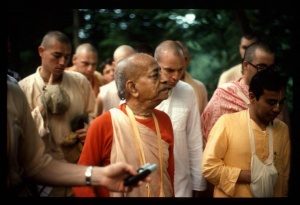CC Antya 17.35 (1975): Difference between revisions
(Vanibot #0027: CCMirror - Mirror CC's 1996 edition to form a basis for 1975) |
(Vanibot #0020: VersionCompareLinker - added a link to the Version Compare feature) |
||
| Line 2: | Line 2: | ||
<div style="float:left">'''[[Sri Caitanya-caritamrta (1975)|Śrī Caitanya-caritāmṛta (1975)]] - [[CC Antya (1975)|Antya-līlā]] - [[CC Antya 17 (1975)|Chapter 17: The Bodily Transformations of Lord Śrī Caitanya Mahāprabhu]]'''</div> | <div style="float:left">'''[[Sri Caitanya-caritamrta (1975)|Śrī Caitanya-caritāmṛta (1975)]] - [[CC Antya (1975)|Antya-līlā]] - [[CC Antya 17 (1975)|Chapter 17: The Bodily Transformations of Lord Śrī Caitanya Mahāprabhu]]'''</div> | ||
<div style="float:right">[[File:Go-previous.png|link=CC Antya 17.34 (1975)|Antya-līlā 17.34]] '''[[CC Antya 17.34 (1975)|Antya-līlā 17.34]] - [[CC Antya 17.36 (1975)|Antya-līlā 17.36]]''' [[File:Go-next.png|link=CC Antya 17.36 (1975)|Antya-līlā 17.36]]</div> | <div style="float:right">[[File:Go-previous.png|link=CC Antya 17.34 (1975)|Antya-līlā 17.34]] '''[[CC Antya 17.34 (1975)|Antya-līlā 17.34]] - [[CC Antya 17.36 (1975)|Antya-līlā 17.36]]''' [[File:Go-next.png|link=CC Antya 17.36 (1975)|Antya-līlā 17.36]]</div> | ||
{{CompareVersions|CC|Antya 17.35|CC 1975|CC 1996}} | |||
{{RandomImage}} | {{RandomImage}} | ||
==== TEXT 35 ==== | ==== TEXT 35 ==== | ||
<div class="verse"> | <div class="verse"> | ||
:kailā jagate veṇu-dhvani, | :kailā jagate veṇu-dhvani, siddha-mantrā yoginī, | ||
:dūtī hañā mohe nārī-mana | :dūtī hañā mohe nārī-mana | ||
:mahotkaṇṭhā bāḍāñā, | :mahotkaṇṭhā bāḍāñā, ārya-patha chāḍāñā, | ||
: | :āni' tomāya kare samarpaṇa | ||
</div> | </div> | ||
| Line 20: | Line 19: | ||
<div class="synonyms"> | <div class="synonyms"> | ||
kailā—You have made; jagate—in the world; veṇu-dhvani—the vibration of the flute; siddha-mantrā—perfected in chanting mantras; yoginī—a female mystic; dūtī—a messenger; hañā—being; mohe—enchants; nārī-mana—the minds of women; mahā-utkaṇṭhā—great anxiety; bāḍāñā—increasing; ārya-patha—the regulative principles; chāḍāñā—inducing to give up; | kailā—You have made; jagate—in the world; veṇu-dhvani—the vibration of the flute; siddha-mantrā—perfected in chanting mantras; yoginī—a female mystic; dūtī—a messenger; hañā—being; mohe—enchants; nārī-mana—the minds of women; mahā-utkaṇṭhā—great anxiety; bāḍāñā—increasing; ārya-patha—the regulative principles; chāḍāñā—inducing to give up; āni'-bringing; tomāya—to You; kare samarpaṇa—delivers. | ||
</div> | </div> | ||
| Line 27: | Line 26: | ||
<div class="translation"> | <div class="translation"> | ||
" 'When You play Your flute, it acts like a messenger in the form of a yoginī perfect in the art of chanting mantras. This messenger enchants all the women in the universe and attracts them to You. Then she increases their great anxiety and induces them to give up the regulative principle of obeying superiors. Finally, she forcibly brings them to You to surrender in amorous love. | |||
</div> | </div> | ||
Latest revision as of 23:16, 26 January 2020

A.C. Bhaktivedanta Swami Prabhupada
TEXT 35
- kailā jagate veṇu-dhvani, siddha-mantrā yoginī,
- dūtī hañā mohe nārī-mana
- mahotkaṇṭhā bāḍāñā, ārya-patha chāḍāñā,
- āni' tomāya kare samarpaṇa
SYNONYMS
kailā—You have made; jagate—in the world; veṇu-dhvani—the vibration of the flute; siddha-mantrā—perfected in chanting mantras; yoginī—a female mystic; dūtī—a messenger; hañā—being; mohe—enchants; nārī-mana—the minds of women; mahā-utkaṇṭhā—great anxiety; bāḍāñā—increasing; ārya-patha—the regulative principles; chāḍāñā—inducing to give up; āni'-bringing; tomāya—to You; kare samarpaṇa—delivers.
TRANSLATION
" 'When You play Your flute, it acts like a messenger in the form of a yoginī perfect in the art of chanting mantras. This messenger enchants all the women in the universe and attracts them to You. Then she increases their great anxiety and induces them to give up the regulative principle of obeying superiors. Finally, she forcibly brings them to You to surrender in amorous love.